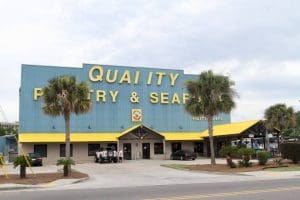
Todd Rosetti, the sales manager of Quality Poultry & Seafood, was the only defendant sentenced to prison for his role in a conspiracy to mislabel seafood, passing off foreign fish as fresh Gulf catches. On Wednesday, U.S. District Judge Sul Ozerden sentenced Rosetti to eight months in prison, followed by 180 days of house arrest. Judge Ozerden acknowledged that Rosetti had entered into a plea agreement, allowing him to plead guilty to a misdemeanor charge of mislabeling seafood instead of a felony conspiracy charge. The guidelines for his offense allowed a maximum sentence of one year and a fine of up to $1,000.
The judge described Rosetti as “the ultimate authority” in the scheme, emphasizing that he was the driving force behind the fraudulent activities. This scheme defrauded up to 300 customers at Quality Poultry & Seafood’s retail and wholesale business in Biloxi. The mislabeling started as early as 1999, and the documented fraud lasted from at least December 2013 until November 2019.
Mary Mahoney’s Old French House restaurant, a Biloxi landmark, was part of the conspiracy, with many unaware that they were paying premium prices for fish sourced from India, Africa, and other countries. Mahoney’s co-owner, Anthony “Tony” Cvitanovich, and the restaurant were sentenced in November for their role in the scheme. Cvitanovich was sentenced to four months of house arrest.
Jeremy Korzenik, a senior trial attorney from the U.S. Justice Department, stressed that despite involving seafood, the case was rooted in financial fraud, stating, “It’s a way of making money by deceiving others.”
In addition to the prison term, Rosetti was ordered to perform 100 hours of community service and serve one year of supervised release. Quality Poultry & Seafood, which pleaded guilty to felony conspiracy charges, was fined $500,000 and sentenced to five years of probation. The company’s owner, Clell Rosetti, expressed regret and vowed that this would not happen again.
James Gunkel, the business manager of Quality Poultry & Seafood, who initially tried to stop the mislabeling but later participated, was sentenced to one year of home detention, two years of probation, 50 hours of community service, and a $1,000 fine. Gunkel’s attorney, Joe Sam Owen, stated that Gunkel had fully cooperated with investigators.
The conspiracy involved the sale of 58,750 pounds (over 29 tons) of imported fish—such as Lake Victoria perch and triggerfish—sold as more desirable local fish like snapper at Mahoney’s. Despite being raided in 2018, Quality continued to sell misbranded seafood until the November 2019 raid of Mahoney’s. Special Agent Martin T. Holloway of the U.S. Food and Drug Administration led the investigation.
